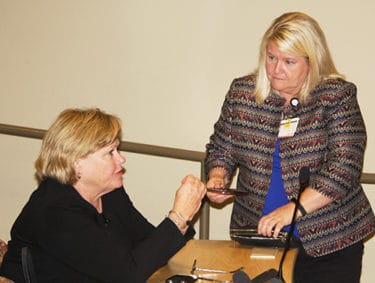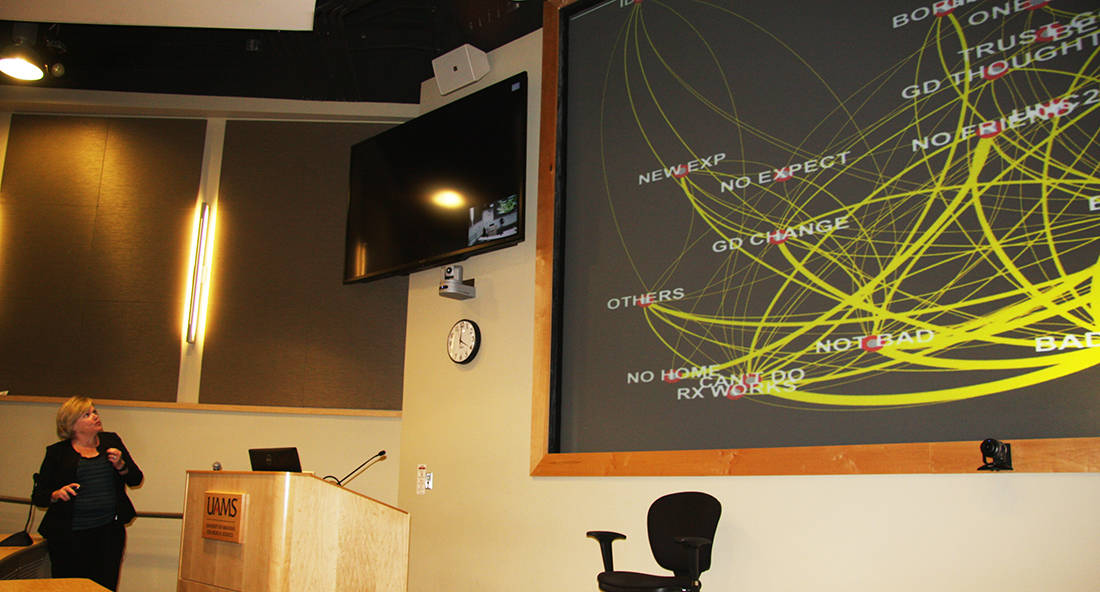College of Nursing Speaker Outlines Sleep Research of Cancer Survivors
| A leading nurse scientist, Belinda Mandrell, Ph.D., R.N., has found that nurses can be the solution to meeting challenging research requirements.
Mandrell is the director of nursing research at St. Jude Children’s Research Hospital in Memphis, Tennessee. Introduced by UAMS College of Nursing Dean Patricia Cowan, Ph.D., R.N., she was this year’s guest speaker Sept. 30 as part of the UAMS College of Nursing-sponsored Dalme-Rickel Distinguished Visiting Lectureship in Oncology/Public Health.
Mandrell’s presentation described completed and ongoing research, as well as clinical implications.

Mandrell and UAMS College of Nursing Dean Patricia Cowan, Ph.D., R.N., talk before Mandrell delivers her lecture.
The first described study explored sleep and fatigue in hospitalized pediatric patients receiving chemotherapy and symptom-associated cytokines. Due to the variability of cytokines, the samples were collected at 5 a.m. every morning by the clinical nursing staff. Cytokines IL-6 and TNF-α were associated with increased fatigue among adolescent patients.
“When developing this study, I invited bedside clinical nurses to join my research protocol,” Mandrell said. “That’s why it is so important for us, as nursing scientists, to include the bedside nurse. I made them co-investigators, so they were very excited about participating. They knew they were part of the study. This also ensured the 5 a.m. clinical samples were collected in a timely manner.”
Additionally, chemotherapy treatments for patients with brain tumors damage the cells in the brain that make hypocretin, which regulates wakefulness, resulting in excessive daytime sleepiness. Mandrell’s study found that patients with higher hypocretin levels had a better sleep efficiency. Those with low levels took an hour or more to fall asleep. Both groups had poor sleep, but lower levels meant worse sleep. The higher risk patient was likely to have received higher intensity therapy, with more hypocretin cell damage.
Mandrell said her goal as a researcher is to understand the biological mechanisms that drive the symptoms of the patient’s experience. Her focus is on pediatric cancer survivorship, looking at the effects associated with childhood cancer treatment and the aging survivor.
“Two of the most distressing complaints are sleep and fatigue, whether they are children or adult survivors,” she said. “They report problems two to three times higher than the normal population.” Therefore, her focus is symptom interventions specific to sleep disturbances.
She has since led several studies looking at patients with other types of cancer and tumors, even using devices to track their sleep patterns at home. Among Hodgkin Lymphoma survivors, half reported sleep disturbance, but when monitored more than 70% had significantly poorer sleep. The survivors in that study showed a sleep efficiency of 82%, while a sleep efficiency of at least 92% is expected, Mandrell said. The sleep disturbance was associated with lower working memory, fatigue and pulmonary hypertension associated with an increased frequency of waking. Pilot work has suggested obstructive sleep apnea secondary to thoracic radiation. Her current NIH-funded study explores the prevalence of obstructive sleep apnea among adult survivors of childhood Hodgkin Lymphoma, comparing to age, sex and body build matched controls.
“When we look at survivors of any disease, many times they become acclimated to their symptom and may underreport,” Mandrell said. “It’s become a part of them, and they no longer perceive the difference between a good night’s sleep and being well rested.”
“We wind up with an adolescent with neurocognitive issues, struggling academically and not being able to stay awake in class,” she said. “I want to return them to being active and alert and participating again with good quality of life.”
Frances Dalme, Ph.D., was a former UAMS College of Nursing associate dean, a longtime faculty member in the college and a community health nurse. She established the lectureship, which also honors the work of Linda Rickel, one of the first oncology nurse specialists in Arkansas.
